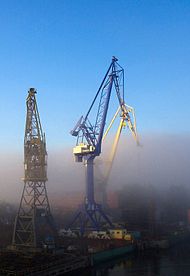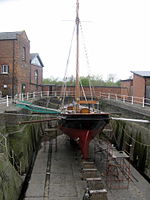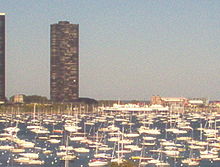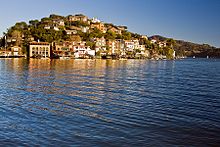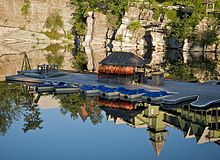- Dock (maritime)
-
For other uses, see Dock.
A dock (from Dutch dok) is a human-made structure or group of structures involved in the handling of boats or ships, usually on or close to a shore.
However, the exact meaning varies among different variants of the English language. "Dock" may also refer to a dockyard or shipyard where the loading, unloading, building, or repairing of ships occurs.
Contents
History
The world's oldest known dock at Lothal (2400 BCE) was located away from the main current to avoid deposition of silt.[1] Modern oceanographers have observed that the Harappans must have possessed great knowledge relating to tides in order to build such a dock on the ever-shifting course of the Sabarmati, as well as exemplary hydrography and maritime engineering.[1] This was the earliest known dock found in the world, equipped to berth and service ships.[1] It is speculated that Lothal engineers studied tidal movements, and their effects on brick-built structures, since the walls are of kiln-burnt bricks.[2] This knowledge also enabled them to select Lothal's location in the first place, as the Gulf of Khambhat has the highest tidal amplitude and ships can be sluiced through flow tides in the river estuary.[2] The engineers built a trapezoidal structure, with north-south arms of average 21.8 metres (71.5 ft), and east-west arms of 37 metres (121 ft).[2]
British English
In British English, a dock is an enclosed area of water used for loading, unloading, building or repairing ships. Such a dock may be created by building enclosing harbour walls into an existing natural water space, or by excavation within what would otherwise be dry land.
There are two specific elaborations of the dock:
- A wet dock (or impounded dock) is a variant in which the water is impounded either by dock gates or by a lock, thus allowing ships to remain afloat at low tide in places with high tidal ranges. The world's first enclosed wet dock with lock gates to maintain a constant water level irrespective of tidal conditions was the Howland Great Dock on the River Thames, built in 1703. The dock was merely a haven surrounded by trees, with no unloading facilities. The world's first commercial enclosed wet dock, with quays and unloading warehouses, was Steers Dock at Liverpool, built in 1715. This reduced ship waiting giving quick turn arounds, greatly improving the throughput of cargo.
- A drydock is another variant, also with dock gates, which can be emptied of water to allow investigation and maintenance of the underwater parts of ships.
A dockyard (or "shipyard") consists of one or more docks, usually with other structures.
American English
In American English, a dock is technically synonymous with pier or wharf—any human-made structure in the water intended for people to be on. However, in modern use, pier is generally used to refer to structures originally intended for industrial use, such as seafood processing or shipping, and more recently for cruise ships, and dock is used for most everything else, often with a qualifier, such as ferry dock, swimming dock, ore dock and others. However, pier is also commonly used to refer to wooden or metal structures that extend into the ocean from beaches and are used, for the most part, to accommodate fishing in the ocean without using a boat.
In American English, the term for the water area between piers is "slip".
In the cottage country of Canada and the United States, a dock is a wooden platform built over water, with one end secured to the shore. The platform is used for the boarding and offloading of small boats.
See also
- Dry dock: a narrow basin that can be flooded and drained to allow a load to
come to rest on a dry platform - Ferry slip: a specialized docking facility that receives a ferryboat
- Floating dock
- Harbor
- Jetty
- Marina
- Mole (architecture)
- Pier: a raised walkway over water, supported by widely spread piles or pillars
- Pontoon (boat): a buoyant device, used to support docks or floating bridges
- Quay
- Wet dock
- Wharf: a fixed platform, commonly on pilings, where ships are loaded and unloaded
References
Bibliography
- Rao, S. R. (1985). Lothal. Archaeological Survey of India.
External links
Categories:- Coastal construction
- Commercial item transport and distribution
- Nautical terms
- Docks
- Port infrastructure
- Inventions of the Indus Valley Civilization
Wikimedia Foundation. 2010.

